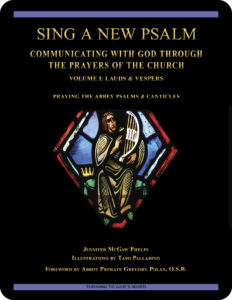 Sing a New Psalm:
Sing a New Psalm:
Communicating with God Through
the Prayers of the Church
Volume I: Lauds & Vespers
Lesson 15 Let My Prayer Be As Incense
Psalm 141, Psalm 116:10–19, and Psalm 16
Sunday 1st Vespers (Week II)
Revised Standard Version Catholic Edition (RSVCE)*
New American Bible Revised Edition (NABRE)*
Catechism of the Catholic Church
Rosarium Virginis Mariae (Rosary of the Virgin Mary)
ex libris (in our library)
next lesson: His Mercy Endures Forever
This material coordinates with Lesson 15 on pages 62–65 in Sing a New Psalm: Communicating with God Through the Prayers of the Church—Volume I: Lauds & Vespers. Our Catholic Bible study is based on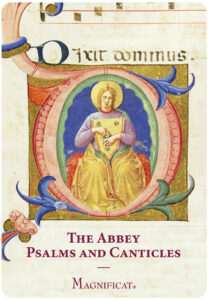 The Abbey Psalms and Canticles, an English translation of the Psalms prepared by the monks at Conception Abbey in 2010 and first published as The Revised Grail Psalms. The Abbey Psalms and Canticles is a revision of that work, finished in 2020 and published by the United States Conference of Catholic Bishops (USCCB). Wording and numbering of some Psalms and verses in other translations may differ. This new translation of the Psalms in the process of being added to all English-language Liturgy of the Hours books used in the United States. The USCCB also plans a liturgical Bible based on the NABRE translation.
The Abbey Psalms and Canticles, an English translation of the Psalms prepared by the monks at Conception Abbey in 2010 and first published as The Revised Grail Psalms. The Abbey Psalms and Canticles is a revision of that work, finished in 2020 and published by the United States Conference of Catholic Bishops (USCCB). Wording and numbering of some Psalms and verses in other translations may differ. This new translation of the Psalms in the process of being added to all English-language Liturgy of the Hours books used in the United States. The USCCB also plans a liturgical Bible based on the NABRE translation.
“Unlike other prayers in sacred Scripture, the prayers contained in the Psalms are not inserted into a narrative story that specifies their meaning and function. Instead, the Psalms are given to the believer precisely as a text of prayer. Since they are the Word of God, the believer who prays the Psalms speaks to God using the very words that God himself has given to us. Thus, in praying the Psalms we learn to pray. The Psalms are a school of prayer.”—Pope Benedict XVI
welcome to our in-depth study of the Psalms
We invite groups and individuals to check out the sample first lesson from this 28- lesson Turning to
lesson Turning to  God’s Word Catholic Bible study. Our online study pages include additional questions, commentary, and prayers based on the Psalm texts. Sing a New Psalm: Communicating with God Through the Prayers of the Church—Volume I: Lauds & Vespers has been granted an imprimatur. A digital version of this study can be purchased from our website shop. Volume II: Vigils, Day Prayer & Compline is scheduled for publication in 2025. If you have a Bible-study question or comment, click on one of the “ask us your question” or “what do you think” buttons on any online study page.
God’s Word Catholic Bible study. Our online study pages include additional questions, commentary, and prayers based on the Psalm texts. Sing a New Psalm: Communicating with God Through the Prayers of the Church—Volume I: Lauds & Vespers has been granted an imprimatur. A digital version of this study can be purchased from our website shop. Volume II: Vigils, Day Prayer & Compline is scheduled for publication in 2025. If you have a Bible-study question or comment, click on one of the “ask us your question” or “what do you think” buttons on any online study page.
open with prayer
It’s always wise to begin any Bible study with prayer, whether reading the Scriptures alone or meeting with others in a discussion study group. You can pray using your own words, pray one of the Psalms in this lesson, or use one of the opening prayers on our website. We especially like the following:
Lord Jesus, you promised to send your Holy Spirit
to teach us all things.
As we read and study your word today,
allow it to touch our hearts and change our lives. Amen.
find a way to pray the Psalms that works for you
“Let My Prayer Be As Incense” is the title of this lesson. There are many ways to go about praying the Psalms. Although these prayers originally were intended to be sung, not everyone is musically inclined. 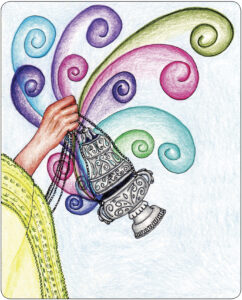 Perhaps you’re more comfortable writing your thoughts. If visual arts are your thing, you might want to
Perhaps you’re more comfortable writing your thoughts. If visual arts are your thing, you might want to 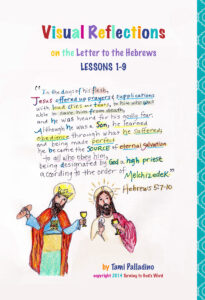 consider creating a prayer journal that focuses on your own drawings inspired by Scripture. For examples of visual lectio divina, check out the illustrated prayer journal created by Turning to God’s Word co-founder Tami Palladino. That collection of meditations accompanies the Turning to God’s Word Catholic Bible study The Letter to the Hebrews: An Explanation of the Mechanism of Our Salvation. Click to enlarge Tami’s illustration (right) for Lesson 15 in our Psalms Bible study. Her original illustration is on page 63 in Sing a New Psalm: Communicating with God Through the Prayers of the Church—Volume I: Lauds & Vespers.
consider creating a prayer journal that focuses on your own drawings inspired by Scripture. For examples of visual lectio divina, check out the illustrated prayer journal created by Turning to God’s Word co-founder Tami Palladino. That collection of meditations accompanies the Turning to God’s Word Catholic Bible study The Letter to the Hebrews: An Explanation of the Mechanism of Our Salvation. Click to enlarge Tami’s illustration (right) for Lesson 15 in our Psalms Bible study. Her original illustration is on page 63 in Sing a New Psalm: Communicating with God Through the Prayers of the Church—Volume I: Lauds & Vespers.
how might your prayers be considered a sacrifice?
Although Christians often view prayer as a duty, it’s less common for us to think of praying as offering a sacrificial gift to God. The title of this lesson is taken from Psalm 141. The image of prayer as incense provides an important clue about the Psalmist’s state of mind. Because incense is associated with sacrifice, the connection between prayer and sacrifice isn’t difficult to see. In our present-day world, we’re likely to lose sight of sacrifice as a gift. By associating prayer and incense, the Psalmist is suggesting that our prayer needs to be as persistent as smoke that rises when incense is burned. The Psalmist also is suggesting that it isn’t necessary for us to do anything particularly flashy to get God’s attention. Not to be overlooked is the importance of the time factor. Our prayers are to be like incense offered during the evening oblation, a repetitive act through which we habitually address the Creator of the universe. You can read more in “Prayer as a Sacrifice” on page 62 in Sing a New Psalm: Communicating with God Through the Prayers of the Church—Volume I: Lauds & Vespers.
 the popes inspire us—uniting prayer with existence
the popes inspire us—uniting prayer with existence
Don’t overlook “Sacrificial Act” on page 63 in Sing a New Psalm: Communicating with God Through the Prayers of the Church—Volume I: Lauds & Vespers. In an excerpt from a general audience, Pope St. John Paul II explains how a sincere prayer becomes a sacrifice to God, allowing the person who’s praying to offer his or her very existence to the LORD. Consider what the LORD might offer in return.
praying in the name of the LORD
Participants in one of our Des Moines groups spent some time discussing the phrase “I will call on the name of the LORD,” which appears twice in Psalm 116:10–19. Repetition indicates that these words hold special significance for the Psalmist, but the idea of the meaning of a person’s name has changed somewhat between the time that the Psalms were written and now. To the ancients, a name was more than a simple label that could be used to distinguish one person from another. A person’s name represented his or her essence. When the Psalmist calls on the name of the LORD, he’s saying that he has a close and intimate enough relationship with God to know God’s name. The Psalmist already is on personal terms with God. He expects God to respond because God is familiar with the Psalmist and with details of the Psalmist’s life. God and the Psalmist know each other well.
ex libris—insights related to using God’s name in prayer
The Psalms have been considered the prayer of the Church since the earliest days of Christianity, and 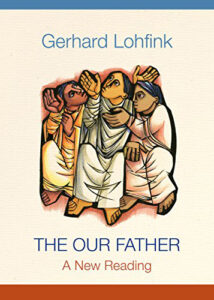 present-day Christians can benefit from thinking about the most effective ways to
present-day Christians can benefit from thinking about the most effective ways to  pray. The Our Father: A New Reading, a short, readable work by German Scripture scholar Gerhard Lohfink, provides an antidote to something many Christians struggle with—treating the Our Father and other rote prayers in a routine or ho-hum manner. While the author writes in depth about each of the petitions in the Our Father, his insights into the title that Jesus taught us to address God are enlightening to any discussion about the name of the LORD. Read excerpts and learn more about The Our Father: A New Reading and other works related to Bible study at ex libris—main bookshelf.
pray. The Our Father: A New Reading, a short, readable work by German Scripture scholar Gerhard Lohfink, provides an antidote to something many Christians struggle with—treating the Our Father and other rote prayers in a routine or ho-hum manner. While the author writes in depth about each of the petitions in the Our Father, his insights into the title that Jesus taught us to address God are enlightening to any discussion about the name of the LORD. Read excerpts and learn more about The Our Father: A New Reading and other works related to Bible study at ex libris—main bookshelf.
the God of the Hebrews is relational
In Old Testament tradition, the name of the LORD was so holy that it never was to be spoken. The third chapter in the book of Exodus describes God revealing his name to Moses at the burning bush. In The Abbey Psalms and Canticles and The Revised Grail Psalms as well as in other English translations of Scripture, this unspeakable name of God is indicated by LORD. (Lord, on the other hand, is a simple title of respect given to another person.) It’s of some interest that prior to the time of Moses, no one knew God by name. Hebrews referred to God in terms of God’s relationship with their patriarchs—”the  God of Abraham,” “the God of Abraham and Isaac,” or “The God of Abraham, Isaac, and Jacob.” The occasional use of LORD in the first five books of the Old Testament supports scholarly opinion that all of these books of Scripture were written no earlier than the time of Moses. Some scholars advance
God of Abraham,” “the God of Abraham and Isaac,” or “The God of Abraham, Isaac, and Jacob.” The occasional use of LORD in the first five books of the Old Testament supports scholarly opinion that all of these books of Scripture were written no earlier than the time of Moses. Some scholars advance  the idea that the Torah wasn’t compiled until much later, possibly during the reign of Josiah, and put in final form shortly thereafter at the time of the Babylonian Captivity. You can learn more about God’s conversation with Moses in Lesson 3 God Reveals His Name: ‘I AM WHO I AM’ in the Turning to God’s
the idea that the Torah wasn’t compiled until much later, possibly during the reign of Josiah, and put in final form shortly thereafter at the time of the Babylonian Captivity. You can learn more about God’s conversation with Moses in Lesson 3 God Reveals His Name: ‘I AM WHO I AM’ in the Turning to God’s  Word Catholic Bible study You Shall Have No other Gods: The Book of Exodus. Learn more about the lives of the Old Testament patriarchs in our in-depth Catholic Bible study In the Beginning: The Book of Genesis. The Turning to God’s Word overview of the prophets—Thus Says the LORD: God Speaks
Word Catholic Bible study You Shall Have No other Gods: The Book of Exodus. Learn more about the lives of the Old Testament patriarchs in our in-depth Catholic Bible study In the Beginning: The Book of Genesis. The Turning to God’s Word overview of the prophets—Thus Says the LORD: God Speaks  Through His Servants the Prophets—provides additional information about events leading to the Babylonian Captivity (Volume I: A Kingdom Divided) and activity of God’s people following that exile (Volume II: Restoration & Redemption).
Through His Servants the Prophets—provides additional information about events leading to the Babylonian Captivity (Volume I: A Kingdom Divided) and activity of God’s people following that exile (Volume II: Restoration & Redemption).
WHAT DO YOU THINK about your relationship with God?
It’s always a good idea to consider where we stand in terms of our faith, as well as what we could be doing better.
 ? In the Scriptures, we read about the relationships God enters into with various men and women. Based on your previous knowledge of the Bible, which of these relationships would you like to know more about?
? In the Scriptures, we read about the relationships God enters into with various men and women. Based on your previous knowledge of the Bible, which of these relationships would you like to know more about?
? With which biblical character in either the Old or the New Testament do you most closely identify?
? With which biblical character in either Testament do you feel that you have the least in common?
? Consider what an ideal relationship with God could look like.
? What can you do to come closer to that ideal?
 prayer—you could look it up in our archives
prayer—you could look it up in our archives
When Catholics pray, we most frequently use the words of the Our Father (the Lord’s Prayer). The Gospel According to Matthew 6:7–15 records Jesus teaching this prayer to his disciples. In Lost in Translation, Turning to God’s Word author Matthew Phelps helps readers connect with ideas expressed in the original languages of the Scriptures, including in this prayer. New Lost in Translation entries are posted on Mondays, and past entries are archived on our website. Contact us if you’d like to receive Lost in Translation by email every week.
read the Catechism—thanksgiving & sacrifice & Eucharist
Psalm 116:10–19 ends with the Psalmist offering a thanksgiving sacrifice, which Christians view in light 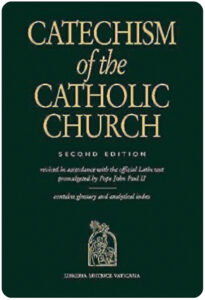 of the sacrament of the Eucharist. Paragraphs 1356–1361 in the Catechism of the Catholic Church explain the connection between thanksgiving, sacrifice, and the sacrament of the Eucharist. The bare-bones gist of this teaching can be summed up this way in paragraph 1358 in the Catechism of the Catholic Church:
of the sacrament of the Eucharist. Paragraphs 1356–1361 in the Catechism of the Catholic Church explain the connection between thanksgiving, sacrifice, and the sacrament of the Eucharist. The bare-bones gist of this teaching can be summed up this way in paragraph 1358 in the Catechism of the Catholic Church:
1358 We must therefore consider the Eucharist as:
—thanksgiving and praise to the Father;
—the sacrificial memorial of Christ and his Body;
—the presence of Christ by the power of his word and of his Spirit.
 watch some videos—understanding Old Testament liturgy
watch some videos—understanding Old Testament liturgy
People in one of our Psalms study groups expressed interest in learning more about ancient Hebrew worship practices. We recommend the videos recorded during author Matthew Phelps’ conference talks at our 2017 summer Bible study retreat. For these videos and talks from other previous retreats, check out our video page. You can learn more about the New Testament apocalyptic  vision of heaven that builds on Old Testament prophecy in the Turning to God’s Word Catholic Bible study The Revelation of Jesus Christ: The Faithful Witness.
vision of heaven that builds on Old Testament prophecy in the Turning to God’s Word Catholic Bible study The Revelation of Jesus Christ: The Faithful Witness.
t he best Catholic commentary about Scripture
he best Catholic commentary about Scripture
To find out more about how Church teaching is supported by passages in Sing a New Psalm: Communicating with God Through the Prayers of the Church—Volume I: Lauds & Vespers, check out the Index of Citations in the Catechism of the Catholic Church. Links (Revised Standard Version Catholic Edition [RSVCE*]) to the primary Scripture passages in the lesson and relevant paragraphs in the Catechism are provided here. Not every passage in the biblical text for this study is referenced in a Catechism paragraph, however, including Psalm 141 in this lesson.
Psalm 16:9–10—paragraph 627
Psalm 116:12—paragraph 224
Psalm 116:13—paragraph 1330
Psalm 116:17—paragraph 1330
don’t forget about our indexes & extra online material

 If you’re trying to locate information about a specific Scripture passage, you can look it up in the index at the back of the study book or sample lesson. If you want to find a particular commentary, you can look up its title in the topics index. To learn more about another book of the Bible for which there’s a Turning to God’s Word study, visit the online study directories to read the commentaries and watch any accompanying videos. Finally, if you have a question or would like to make a comment about any of our studies, you can use one of the “ask us your question” or “what do you think” buttons to email our authors.
If you’re trying to locate information about a specific Scripture passage, you can look it up in the index at the back of the study book or sample lesson. If you want to find a particular commentary, you can look up its title in the topics index. To learn more about another book of the Bible for which there’s a Turning to God’s Word study, visit the online study directories to read the commentaries and watch any accompanying videos. Finally, if you have a question or would like to make a comment about any of our studies, you can use one of the “ask us your question” or “what do you think” buttons to email our authors.
ex libris—Church documents & books about religious topics
Link to magisterial documents referred to in our Bible studies at ex libris—magisterial documents.  This listing includes significant recent encyclicals as well as a number of historical Church documents. Recommended books related to Scripture study can be found at ex libris—main bookshelf.
This listing includes significant recent encyclicals as well as a number of historical Church documents. Recommended books related to Scripture study can be found at ex libris—main bookshelf.
wondering how to pronounce some of these words?
The following links are to readings from the New International Version (NIV) Bible. To listen, open one of the links and click on the audio icon above the printed text. Although not taken from the translations used in our study materials, the NIV readings provide an audio guide to pronunciation of words in this lesson’s primary biblical texts. A close online version of the translation of the Bible used in Catholic liturgy in the United States as well as an audio guide for daily Mass readings for the current month can be found on the website of the United States Conference of Catholic Bishops (USCCB).
Psalm 141 (NIV)
Psalm 116:10–19 (NIV)
Psalm 16 (NIV)
 close with a Psalms-based prayer for Sunday 1st Vespers (Week II)
close with a Psalms-based prayer for Sunday 1st Vespers (Week II)
Many of our Catholic study groups like to conclude their discussions with a prayer based on the scriptural focus of their lesson. If you’re uncomfortable composing your own Bible-based prayers, you can follow our four easy steps. If you prefer, you can pray any of the Psalms in this lesson, or you can use the following short prayer.
O God, you show us the safe path of life.
Grant that we may be diligent in speaking words
of kindness and truth to others,
and in speaking words of praise and thanksgiving to you.
Be at our side to guide us through difficult situations
in which we’re tempted to sin.
We ask this in the name of your Son, Jesus Christ,
whom you sent to open for us the way to eternal life. Amen.
Lesson 16 His Mercy Endures Forever, Sunday Lauds (Week II)—Psalm 118, Psalm 148, and Psalm 150
Lesson 14 Majesty Set Above the Heavens, Saturday Lauds (Week I)—Psalm 8 and Psalm 65
you also may like our study of Scripture & the Rosary (digital only)
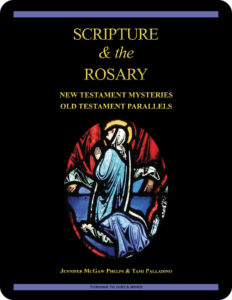 Scripture & the Rosary: New Testament Mysteries, Old Testament Parallels, a 26-lesson Catholic Bible study with an imprimatur, looks at the biblical foundations of the Rosary. The study includes lessons on Pope St. John Paul II’s Rosarium Virginis Mariae (Rosary of the Virgin Mary), the Apostles’ Creed, and the Luminous Mysteries as well as the original 15 Mysteries of the Rosary. Color photographs of stained glass windows depict key scenes in the lives of Jesus and Mary. Free digital lessons rotate throughout the year on our website.
Scripture & the Rosary: New Testament Mysteries, Old Testament Parallels, a 26-lesson Catholic Bible study with an imprimatur, looks at the biblical foundations of the Rosary. The study includes lessons on Pope St. John Paul II’s Rosarium Virginis Mariae (Rosary of the Virgin Mary), the Apostles’ Creed, and the Luminous Mysteries as well as the original 15 Mysteries of the Rosary. Color photographs of stained glass windows depict key scenes in the lives of Jesus and Mary. Free digital lessons rotate throughout the year on our website.
start a Turning to God’s Word Bible study
Thank you for your interest in Sing a New Psalm: Communicating with God Through the Prayers of the Church—Volume I: Lauds & Vespers. 
 More information about beginning a Turning to God’s Word Bible study can be found on this website at start a Bible study, and Tami, Matthew, and I are available to answer questions or discuss concerns. Contact us to start this or one of our other studies or to have your schedule listed with other TtGW study groups on our website. —Jennifer
More information about beginning a Turning to God’s Word Bible study can be found on this website at start a Bible study, and Tami, Matthew, and I are available to answer questions or discuss concerns. Contact us to start this or one of our other studies or to have your schedule listed with other TtGW study groups on our website. —Jennifer
*There are seven deuterocanonical books in the Old Testament—the Books of Tobit, Judith, Wisdom, Sirach, Baruch, and First and Second Maccabees, as well as some passages in the Books of Esther and Daniel. Protestants usually refer to these works as “apocryphal,” a word that means “outside the (Protestant) canon” because they’re excluded from most Protestant Bibles. The word “deuterocanonical” means “second canon”; Catholics use that word to refer to any section of the Catholic Old Testament for which there are no extant, or existing, Hebrew manuscripts. All of the deuterocanonical books appear in the Septuagint, the earliest remaining versions of which date to the 1st century B.C. This Greek translation of the Old Testament was in common use by Jews at the time of Jesus—but the same books aren’t found in existing Hebrew manuscripts, which aren’t as old as the oldest version of the Septuagint. Learn more by reading How Do Catholic & Protestant Bibles Differ?
Turning to God’s Word printed Bible studies use the 2006 Revised Standard Version Second Catholic Edition (RSV2CE) translation for all Scripture references except the Psalms, which are taken from The Abbey Psalms and Canticles, prepared by the monks of Conception Abbey and published in 2020 by the United States Conference of Catholic Bishops (USCCB). All Scripture links for the online study pages for Sing a New Psalm: Communicating with God Through the Prayers of the Church—Volume I: Lauds & Vespers are to the 1966 Revised Standard Version Catholic Edition (RSVCE) translation. The New International Version (NIV) audio recordings follow the same chapter and verse numbering as the RSV Catholic translations, but the NIV doesn’t include the deuterocanonical passages.
The 1966 RSVCE uses archaic pronouns and verb forms such as “thee,” “thou,” “didst” in the Psalms and in direct quotations attributed to God. The 2006 RSV2CE replaces those with more accessible English. The few significant translation changes in the RSV2CE include rendering almah as “virgin” in the Book of Isaiah 7:14 and restoring the term “begotten” in the Gospel According to John 3:16.
The Psalms in this Bible study reflect numbering used in The Abbey Psalms and Canticles; Psalms numbering may vary in other translations. Numbering also may vary for a few other passages in this Bible study. Turning to God’s Word studies follow the numbering in the Revised Standard Version Catholic translations (RSVCE and RSV2CE). Discrepancies in the New American Bible Revised Edition (NABRE) are noted in the Index of Scripture Citations in the study book and the online sample.
 The companion to this Catholic Bible study from Turning to God’s Word, Sing a New Psalm: Communicating with God Through the Prayers of the Church—Volume II: Vigils, Day Prayer & Compline, will cover Psalms not included in Volume I: Lauds & Vespers. Volume II: Vigils, Day Prayer & Compline is scheduled for publication in 2025.
The companion to this Catholic Bible study from Turning to God’s Word, Sing a New Psalm: Communicating with God Through the Prayers of the Church—Volume II: Vigils, Day Prayer & Compline, will cover Psalms not included in Volume I: Lauds & Vespers. Volume II: Vigils, Day Prayer & Compline is scheduled for publication in 2025.
